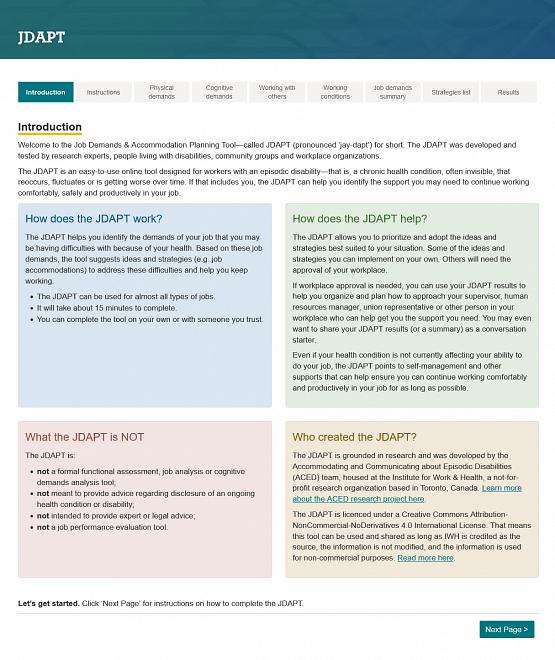The JDAPT
The Job Demands and Accommodation Planning Tool (JDAPT) helps workers with chronic and episodic conditions—and the workplace parties who support them—identify support strategies and accommodations tailored to a worker’s job demands. It can help workers to successfully stay in their jobs.
About eight million Canadians live with limitations to their daily activities due to health or other conditions. These limitations – or disabilities – may be permanent and experienced every day, or they may be “episodic.” Episodic conditions are long-term health conditions, often invisible, where symptoms can re-occur, fluctuate, or worsen over time.
People living with disabilities are less likely to be employed than people without disabilities. They often have to give up work temporarily or permanently and can struggle to return to work.
It is important to remember that health conditions do not necessarily lead to a disability. A disability is when the social and physical environment creates barriers for persons with health conditions. In the workplace, that means that support and changes or modifications to some job tasks can remove the barriers that create a disability.
Both people with disabilities and their workplaces may struggle with knowing how to remove or reduce the barriers that can impact a person’s ability to work. They may ask:
- How should we think about a worker’s needs – what should the focus be?
- What kinds of supports can help someone having difficulties at work meet their different job demands?
The JDAPT
The Job Demands and Accommodation Planning Tool (JDAPT) is an award-winning, easy-to-use, online tool that helps workers and those who support them think systematically about the demands of a specific job and consider a wide range of practical support and accommodation ideas that could help better manage those job demands. It was developed and tested by research experts, people living with disabilities, community groups and workplace organizations.
How the JDAPT differs from other tools:
- It focuses on work demands rather than health symptoms or a diagnosis
- It guides the user through a series of simple questions that ask about the physical, mental or “thinking” tasks of the job, job tasks related to working with others, and working conditions.
- It provides a list of concrete support ideas relevant to the job’s demands and a worker’s needs, which can help workers and organizations generate solutions that work for everyone’s needs.
There are three versions of the JDAPT:
The JDAPT for workers is designed to be used by a person experiencing difficulties at work due to their health, and who is looking for practical supports and accommodation ideas tailored to their specific job demands.
Two versions of the JDAPT have been developed for supervisors, human resources practitioners, disability case managers, union representatives, and other worker advocates who are looking for tailored accommodation ideas that will help them support workers with chronic conditions:
- The JDAPT to support a worker is designed to help identify potential strategies and accommodations for a specific worker experiencing difficulties with their job demands. This version of the tool should be completed by someone familiar with the worker’s day-to-day job demands and experiences.
- The JDAPT for a job can be used to identify the important job demands for a position and how those different job tasks might be made more flexible, supportive, and inclusive for workers in general. For this version, it is not necessary to have a specific worker in mind when answering the JDAPT questions.
A note about privacy: If you are an employer or worker support provider, you may find it helpful to recommend that an employee complete the JDAPT for workers to assess their needs. But it is important to remember that workers are often reluctant to share personal health information because of concerns about negative repercussions from their workplace. Workers should be reassured that their health needs are private, and that the organization and worker versions of the JDAPT are intended to start a conversation about ways to make work more manageable. If a worker completes the worker version of the JDAPT, we recommend that they should not be asked to share their results unless they volunteer them.
Free and anonymous
All ACED tools are available free of charge and are licensed under a Creative Commons Attribution-NonCommercial-NoDerivatives 4.0 International License. That means this tool can be used and shared as long as IWH is credited as the source, the information is not modified, and the information is used for non-commercial purposes. Read more here.
All information entered into the ACED tools is anonymous. We do not collect IP addresses or ask for identifying information such as names or emails. The responses to DCIDE or the JDAPT are stored anonymously for 72 hours to allow for users to save a draft and return within that time. The responses are not accessed or saved and are automatically deleted after 72 hours. See here for more information on the ACED Tools and your privacy.

